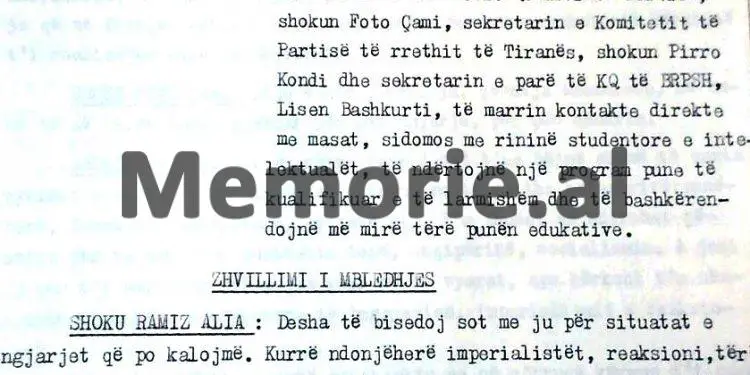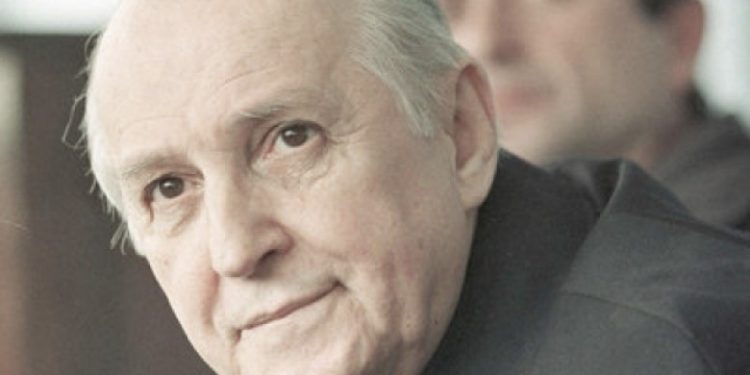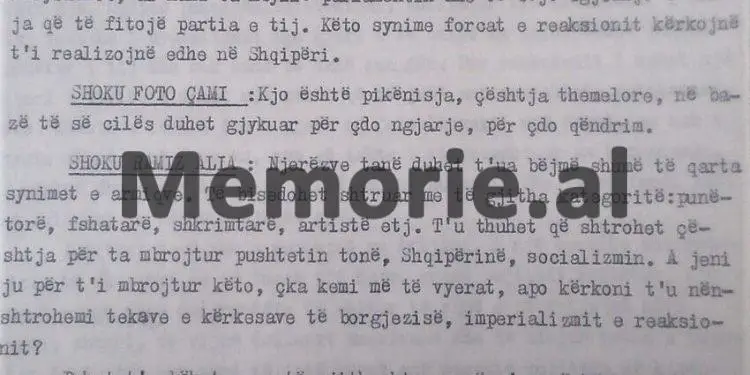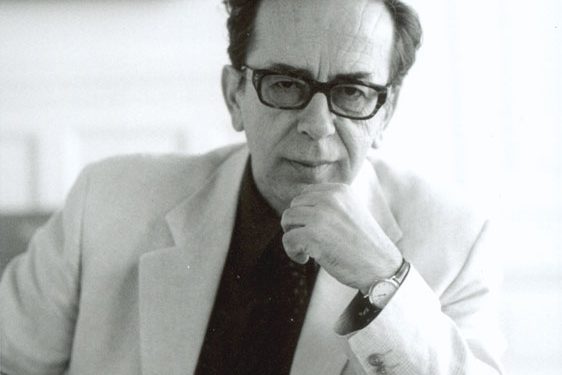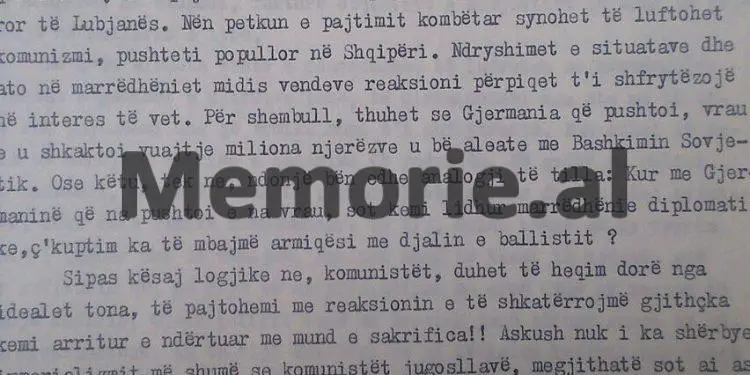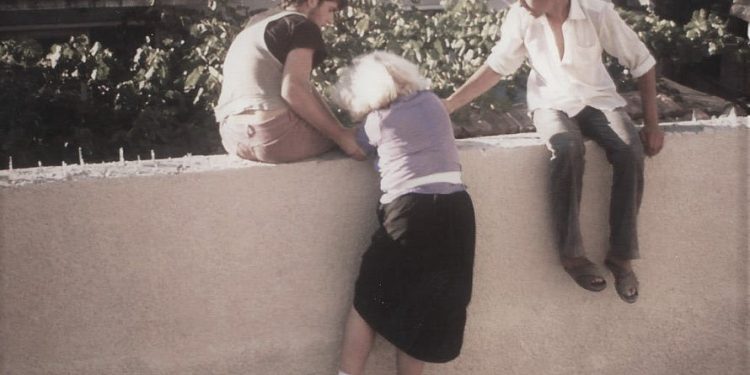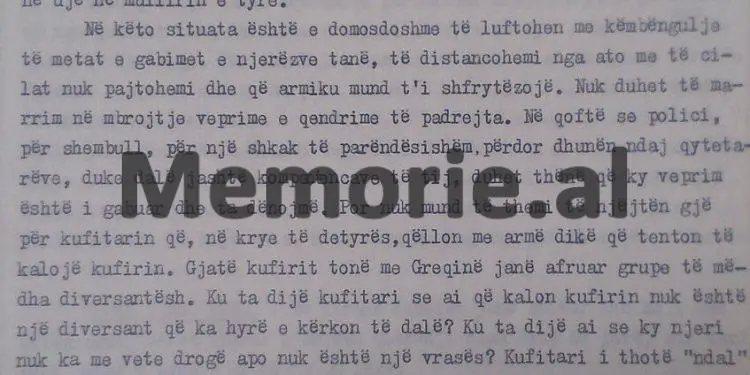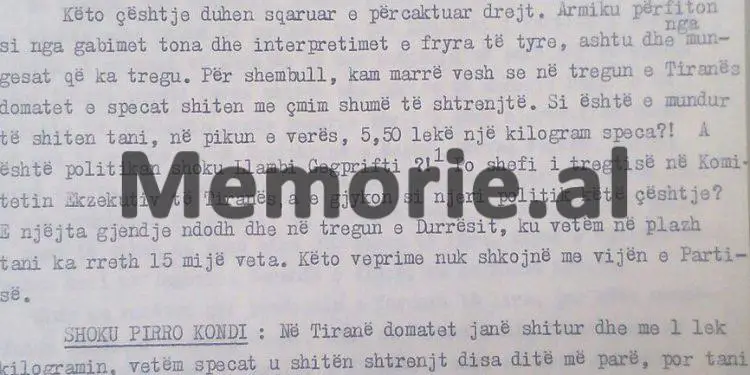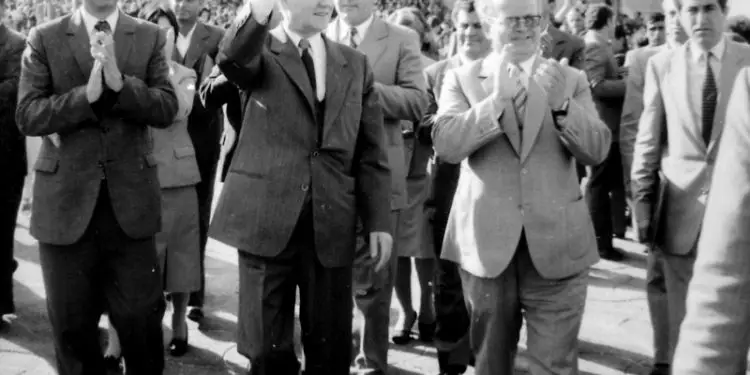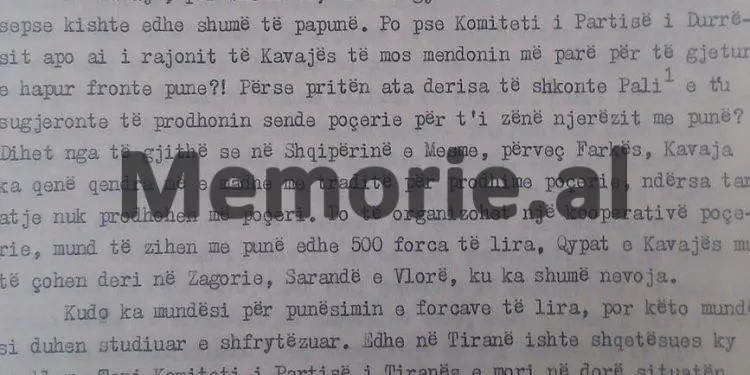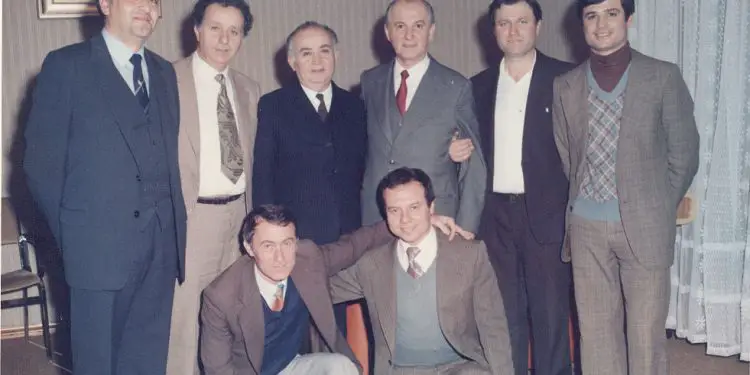Dashnor Kaloçi
Memorie.al publishes an archival document with the initials “Secret” issued by the Central State Archive in Tirana (fund of the former Central Committee of the ALP) belonging to the month of July 1990, where the minutes of the meeting of Secretariat of the Central Committee of the ALP held on dt. July 23, 1990, which under the leadership of Ramiz Alia, analyzed and discussed in detail, all the events that took place at the beginning of that month, where hundreds of thousands of Albanian citizens, of all ages, burst the walls of the railings of foreign embassies that were accredited at the time in Tirana and entered there seeking to emigrate abroad as political asylum seekers. The full minutes of that meeting where Nexhmije Hoxha also participated, in the function of the Chairman of the Democratic Front of the People’s Republic of Albania, where besides them, also discussed the secretaries of the Central Committee of the ALP, Foto Çami and Xhelil Gjoni, the secretary the first of the Central Committee of the Albanian Working Youth Union, Lisen Bashkurti, the first secretary of the Party Committee of the Tirana district and a member of the Central Committee, Pirro Kondi, etc. The full discussion of Ramiz Alia and his debates with the participants of that meeting, about the well-known writer Ismail Kadare, regarding his refusal to give an interview in the newspaper “Zeri i Rinisë”, where he spoke openly against those who entered in the embassies, as well as the “indifference of the Albanian intellectuals, who did not say a word about the invitation that the French President, François Mitterrand, made to Kadare to go to France and to participate as a special guest, in the celebrations of the 200th anniversary of the Revolution French ”?!
This document that we are publishing in this part of the book, is of great interest, since for almost three decades, unfortunately and paradoxically, it has been said that: Kadare has spoken about the refugees who entered the embassy in July 1990, considering them as: “The excrement of the nation”. The document in question is a record of the meeting of the Secretariat of the Central Committee of the ALP dated July 23, 1990, (full three weeks after the opening of the embassies) and it is attended by almost the entire dome of the ruling communist regime, including Nexhmije Hoxha, as well as some other guests, but senior officials of the regime.
And from the beginning of the meeting, Ramiz Alia, informs those present that; “They will not relinquish power without blood” and in the context of this situation, he gives the necessary instructions, where among other things he states: “Photo, Pirroja, and you Lisien, here in Tirana you must design an educational work program to establish standing sound opinion. You can also keep around you some well-known and authoritative intellectuals, such as: Dritëro Agolli, etc., that Ismail Kadare is not feeling “. So Ramiz has accurate information that Kadare did not join them, i.e., the regime and the line of official Tirana. And to his question, Lisien Bashkurti answers, saying: “We went to Ismail three times at home, to ask him for an interview for the newspaper” Zeri i Rinisë “, but he refused to prepare….”.
Meanwhile, Ramiz Alia gives the interlocutors an answer that is both suggestive and commanding: “Why don’t you write in the newspaper that Ismail Kadare refused to give an interview?! In this way, you will bring it before the moral responsibility and before the opinion of the whole youth “. So, as can be seen from the ones we quoted above, Ismail Kadare did not speak at all to those Albanians who entered the embassy, even though they went to his house three times to insist on that.
And Ramiz Alia’s rage against Kadare’s refusal to join the party’s choir or propaganda to attack embassy people goes further. Following the meeting, he openly alludes and accuses Kadare that: he has been put in the service of the West and calls on Albanian intellectuals to speak openly in the press against him and the French President, François Mitterrand, who according to him (so Ramiz), invited Kadare for a visit to France, exactly at that time, “when all those planned hostile actions were carried out and he was angry against Albania”. Like the rest of the documents published in this book, this one is given in full.
Minutes of the meeting of 23 July 1990
Secret
Meeting of the Secretaries of K.Q. of the Party
July 23, 1990
In this meeting, Comrade Ramiz Alia addressed some conclusions, problems and tasks arising from the development of internal and external situations, especially after the events of July 2, 1990 in Tirana. He commissioned the secretary of K.Q. of the Party, comrade Foto Çami, the secretary of the Central Committee of the Tirana District Party, comrade Pirro Kondi, and the first secretary of the Central Committee of the ALP, Lisen Bashkurtin, to get direct contacts with the masses, especially with the student youth and intellectuals, to build a work program qualified and diversified and to better coordinate all educational work.
Collection development.
COMRADE RAMIZ ALIA: I wanted to talk to you today about the situations and events we are going through. Never before have the reactionary imperialists and all the enemies of communism been thrown against him with such a furious attack as now. They aim to eradicate everywhere the seeds of socialism and communism. We must be fully aware that Albania is at the center of this attack: The aim is to overthrow our popular power, to extinguish socialism. These goals stand out even more clearly after the changes and events that took place in Eastern Europe, including the Soviet Union. The latest evidence of this is the events taking place in Bulgaria. President Mladenov was ousted despite being elected a short time ago. Even there, open anti-communist forces are taking power, as happened in Czechoslovakia and Hungary. Under the new constitution they have made, the president can be changed, he can close parliament and hold new elections for his party to win. The reactionary forces seek to achieve these goals in Albania as well.
COMRADE PHOTO ÇAMI: This is the starting point, the basic issue on the basis of which one should judge for every event, for every attitude.
COMRADE RAMIZ ALIA: We must make very clear to our people the intentions of the enemies. Talk openly with all categories: workers, peasants, writers, artists, etc. You are told that the issue is raised to protect our government, Albania, socialism. Are you to defend these, what do we have with the valuables, or do you seeking to submit to the demands and whims of the bourgeoisie, imperialism and reaction? It should also be clear to you how the reaction seeks to achieve these goals. The peculiarity of the current situation is that the enemies try to achieve their goals not in a violent, military, occupation way, but in a peaceful way, and for this purpose they are using three strong weapons: First, democracy is required, but in the meaning given to this term by the bourgeoisie: This democracy for the bourgeoisie, for reaction, for anti-communism. This democracy aims to pave the way for every anti-communist attitude and action and to elaborate the opinion according to the interests of the bourgeoisie. The second requires pluralism. Some people do not understand where the pluralism that the bourgeoisie claims and encourages is aimed at and think lightly that there is nothing wrong with having two or three parties. But this means creating an opposition against our Party, which would not be merely loyal, but a weapon in the hands of reaction to overthrow popular power. In today’s Albania, no serious opposition can be created against the ALP, because no one has the influence to oppose the terrain in which he was and fought until yesterday. Any worker, intellectual, writer, or scientist of this earth and of socialism from whose bosom he has come out, is his companion and cannot go against it. But the reaction needs such a man; it needs a party to be anti-socialist, anti-communist. So he searched for, and found in Czechoslovakia, a Havel that Dubcek did not work for him because he was compromising with communism. He searched for and found one in Hungary. And finally, the same thing is happening in Bulgaria. Our people do not understand that the creation of an anti-communist opposition in Albania means to pave the way for national reconciliation, to pave the way for some sold immigrants to come and form a party here, in short to come the US dollars and buy the votes of our people. It can never be a political opposition in the democratic sense of the word, but a party formed by “rogue” people who have nothing to do with democracy and the homeland, behind whose notions they hide. These people can be followed by other elements within the country, be they vagabonds, fanciful young people or any intellectual element that beyond “democracy” thinks “discovers America”. The models of the parties and their duplicated ideals will resurrect the subsidiaries of the German parties, subsidized by them in Hungary or Czechoslovakia. A typical example of such efforts in our country was the activation of foreign agencies and their coordinated body for the introduction of our people in embassies. So the pluralism that the enemies tried to encourage is not a reflection of democracy, but a means to liquidate popular power peacefully, through bought votes, corruption, political and economic pressure. This is today the favorite weapon of reaction. I can give you some examples to argue this idea. Suffice it to mention the great propaganda noise and the sensational promises made to Poland to give it billions, if Solidarnost took power. The aim of the reaction was to secure votes for Solidarnost, but then no cash assistance was given to Poland. The same promises were now repeated to Romania and Bulgaria, who were hoping to get credit after free elections, but both governments and the masses were disappointed. The third weapon used by the reaction and the bourgeoisie is the free market through which it intends to restore private property, especially large property, in the former socialist countries. Thus political pluralism finds its support in economic pluralism, through which socialist state property is destroyed and turned into private property. It is known that each party expresses the interests of a certain class, or of the representatives of a certain type of property. An agrarian party, for example, can never express the interests of the collective peasantry, because it would be for the protection of agrarian interests, for the land to be the private property of the peasant. Only the Communist party expresses the interests of social property. So political and economic pluralism means the death of popular power or a legal opposition to it. This conclusion is so true that even the recent Common Market statements on aid grants to Eastern European countries came out specifically to encourage the free and private market. In these three directions, the reaction gives way to the plan to overthrow the popular power. In the tendencies for party pluralism, the reaction feeds them by throwing out the idea of national reconciliation. Recently, a so-called All-Albanian Cultural Manifestation took place in Ljubljana, where Ismail Kadare was also invited. The idea that literature should not be politicized, but to be known and studied in all its values, especially the literature of past centuries, not judging by the ideological criteria, but by the national spirit, etc., has appeared in some of our intellectuals and scholars. And lo and behold, “the pear always has a tail behind it”. At the heart of this idea is the spirit of national reconciliation that pervaded the Ljubljana Cultural Manifestation. Under the guise of national reconciliation, the aim is to fight communism, the popular power in Albania. The reaction tries to use the changes of situations and those in the relations between the countries in its own interest. For example, Germany, which invaded, killed, and afflicted millions, is said to have allied itself with the Soviet Union. Or here in our country, someone makes such analogies: When we have established diplomatic relations with Germany, which invaded and killed us, what is the point of maintaining enmity with the ballist’s son? According to this logic, in the communists we must give up our ideals, agree with the reaction and destroy everything we have achieved built with effort and sacrifice?! No one has served imperialism more than the Yugoslav communists, yet today he does not love those communists either. He no longer loves Dolanc, Shuvar, Puniknik who took power in Slovenia, or Milosevic in Serbia, but he loves people like Tudjman, Chetniks and Ustashas, he wants there to be no words of socialism and communism. This framework of events, goals and hostile attacks that threaten Albania must be clear to the communists, the youth, the patriots and all our people. Hence the conclusion and the task of defending popular power, socialism and our victories. This is one side of the problem. The second side is that, in order to achieve their goals, the enemies will try to exploit our weaknesses and shortcomings, difficulties and shortcomings in the economy, objective and subjective factors that can lead water to their mill. In these situations it is necessary to fight persistently the shortcomings and mistakes of our people, to distance ourselves from those with which we cannot agree and which the enemy can exploit. We must not defend unjust actions and attitudes. If the police, for example for an insignificant reason, use violence against the citizen, going beyond his competencies, it should be said that this action is wrong and we should punish him. But we cannot say the same about the border guard, who in the line of duty shoots with a gun someone who tries to cross the border. Large groups of saboteurs have approached our border with Greece. How does the border guard know that the one crossing the border is not a saboteur who has entered and wants to leave? How does he know that this man does not have drugs with him or is not a murderer? The border guard says “stop” to the border trespasser and shoots the one who does not stop. Can we blame him for shooting!? No, he did the homework. But in the Kinostudios team a friend is very worried about this problem and is looking for an answer. It’s not difficult and we should not hesitate to give him the answer he wants immediately, Photo. What would the guard of Kinostudios do, for example, if someone tried to enter to burn the film archive? /Memorie.al
Continues in the next issue





